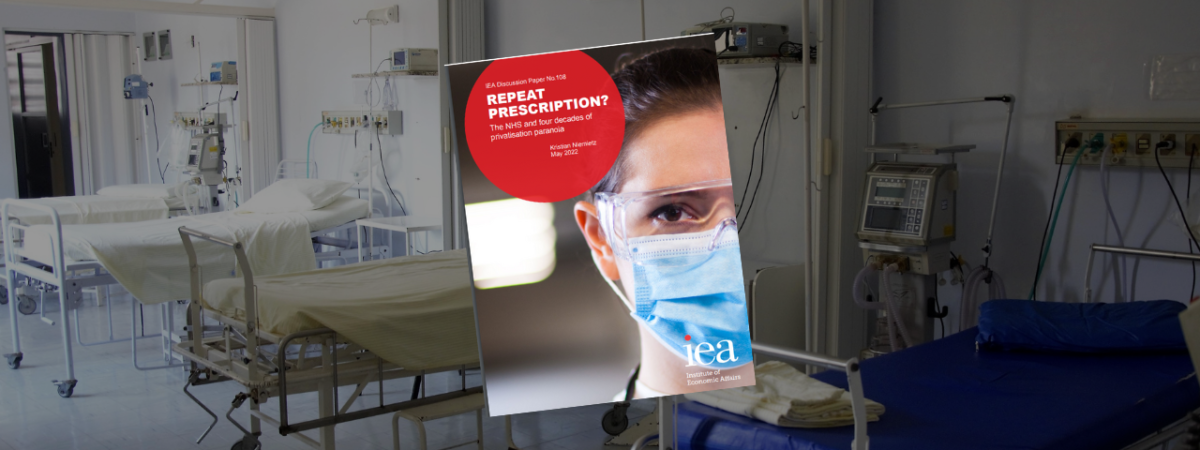Moral panics and conspiracy theories around NHS “privatisation” (Part 3)
SUGGESTED



…continued from part 2
The mother of all moral panics?
In the mid-80s, the government allowed NHS hospitals to contract out so-called “ancillary services”, mostly cleaning and catering, to private companies. This is, in principle, no different from an NHS hospital buying pencils from a private company. But like everything, this was, of course, seen as a “slippery slope” towards privatisation: let private contractors do some cleaning or cooking, and before you know it, they’ll start operating on people.
London Health Emergency (LHE), an anti-“privatisation” campaign group which organised various protests against the policy, argued:
“If privatisation is not nipped in the bud in 1984, it will spread like a malevolent weed through the NHS, strangling health care […] The time to fight is now!”
LHE are still around today, and they are still campaigning against the imminent privatisation of the NHS.
But they were far from alone. As always, the medical establishment, the opposition parties, and the left-wing media soon joined in, turning this into a full-blown moral panic – the 1980s version of “They’re selling our NHS to Donald Trump”, if you will.
Apart from the moral panic around outsourcing, there were also several smaller random panics. These were usually not related to any specific event or policy. The logic was simply: Thatcher is privatising some things, so it logically follows that she must also have a secret plan to privatise the NHS.
For example, in 1983, a trade unionist warned that “they will privatise the NHS next year”, and in 1982, the Guardian warned about a covert agenda leading to “the slow disintegration of the NHS”.
The oldest article of its kind that I have found is a Times article from 1980 entitled “The Tory threat to the health service”, written by the MP Eric Heffer from the Socialist Campaign Group (yes, them again). It talked about a secret plan to replace the NHS with an American-type healthcare system over the course of the next five years. It had all the ingredients of what is now a typical moral panic about NHS “privatisation”.
So is this it? Is this article the mother of all moral panics around the NHS?
Not quite. It is the oldest article I could find which follows this precise format. But when I scoured the news archives, I used “privatisation” and “privatise” as search terms – and those words were not really used before 1980.
This means that for the years before then, there is no obvious search strategy. I tried more generic search terms, such as “destroy” and “dismantle”, and with those, you can find stories going back to the 1950s which contain some – but not all – of the elements of a typical moral panic. This means that those moral panics do not really have an obvious “origin”. There has always been a lot of nervousness around the NHS, and from 1980 onwards, it turned into the specific privatisation paranoia that is still with us today. I don’t know what the next privatisation panic will be about, but I do know that there will be one.
And then another one.
And another.
Why it matters
But why does this matter? Why is this a problem? Could one not simply treat it as an irrational, annoying, bizarre but ultimately harmless obsession?
Unfortunately not. Privatisation paranoia matters for at least three reasons.
First of all, it promotes a climate of permanent hysteria. On its own, healthcare is actually a very dry and technical subject. But our proclivity for moral panics turns it into a Culture War-like issue – and Culture Wars are notoriously toxic.
Secondly, privatisation paranoias have opportunity costs. Every minute we spend panicking about imaginary “privatisation” plans is a minute we can no longer spend debating the substance of health policy. We should have a situation where proponents of a reform explain why they think their reform is a good idea, and their opponents explain why they think it’s not. What we get instead is hysterical denunciations from one side, and angry denials from the other. I find it amazing how, in a country that is so infatuated with its healthcare system, most people know so little about how that system actually works. Most people haven’t got a clue what the Health and Social Care Act was, or a Foundation Trust, or the internal market. That’s not because it’s rocket science, it’s because the people who try to explain those things get crowded out by those who scream “Privatisation! Privatisation!” at everything.
But how can we ever learn anything from previous health reforms if we don’t know anything about them?
Thirdly, privatisation paranoia provides fertile ground for the worst kind of grifters and charlatans. It promotes people to the rank of a “public figure” who, frankly, should be no such thing. People who should be selling the Socialist Worker outside of a tube station, or writing for some obscure conspiracy blog with twelve readers, or ranting on some obscure YouTube channel with twelve viewers. But once you have established yourself as an “NHS campaigner”, you are almost automatically accepted and taken seriously in “polite society”.
The problem is that even though the prophecies of these panic-mongers always age hilariously badly, they are never called out on it. They are never held to account. They are never pressed on the issue. So they just move on to the next prophecy, which will, of course, age just as badly, but which they will not be held to account for either.
It’s about time somebody started doing that.
____
Recommended reading/watching/listening:
- “Repeat Prescription? The NHS and four decades of privatisation paranoia” – Kristian Niemietz
- “The Great NHS Privatisation Myth with Kristian Niemietz” – The Great Unravelling podcast
- “NHS privatisation theory is ‘nonsense’ says Dr Kristian Niemietz” – GB News
- “Is the NHS being privatised?” – Niemietz Answers
1 thought on “Moral panics and conspiracy theories around NHS “privatisation” (Part 3)”
Comments are closed.





To get rid of the toxic unions who had captured them we had to allow shipbuilding, coal, British car manufacturing etc to fold.
The NHS, teaching and rail are the current union-captured industries but unfortunately the taxpayer cannot allow them to fold so the unions have the taxpayer by the ?????.
These industries are run for the benefit of the unions, not the customers. That’s why they fight to keep them nationalised.
The BMA is among the worst. GPs were falsifying death certificates during the pandemic to keep up the pressure for more funding – compare the stats with Germany. Our local (private) pharmacy has and is being starved of vaccines so the GPs next door can scoop up the jab fees.